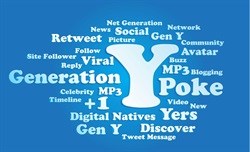Enigma generation - Generation Y

They have short attention spans, are less trusting than previous generations and tend to despise marketing hype but they all have a passion for digital media and a profound attachment to the ever-present mobile phone. Born into the era of round-the-clock connectivity, they thrive in a multimedia-rich world.
Positive attitudes towards social media
"Generation Y students have very positive attitudes towards the social media and, according to our research, Facebook remains the biggest," says Prof Ayesha Bevan-Dye, leader of the ProGenY research group on the Vaal Triangle Campus.
In a recent study on the Facebook attitudes and habits of black Generation Y students at three Gauteng higher education institutions, she found that most of the 400 students' surveyed accessed their Facebook accounts every day.
"The majority of respondents reported having between 201 and 250 Facebook friends and spending between 10 and 30 minutes on the site. As many as 86% accessed Facebook through their cellphones.
"Being relatively heavy Facebook users suggests that Facebook-based brand communities would be a viable method of targeting this segment, especially given evidence that this generation tends to prefer brands with Facebook pages."
A similar ProGenY study on web-based advertising found that black Generation Y students were favourably disposed to it. They ranked web advertising as the third most informative advertising medium, after television and radio and ahead of advertising in newspapers, magazines, direct mail and billboards or posters.
Critical success factors for advertisers
However, these positive attitudes do not mean that just any marketing and advertising strategy will succeed as long as it uses Facebook, the web and the like. In fact, as many as seven criteria should come into play when marketers incorporate Facebook into their Generation Y advertising mix, says Bongazana Dondolo, ProGenY PhD graduate in her thesis on Facebook advertising.
These criteria are information, entertainment, credibility, self-brand congruity, trust in the site, the perceived value of advertising and overall attitudes.
For instance, marketers need to ensure the information they provide is complete, timely, accurate, relevant and current. "This is turn will reduce the time taken to search for products or services and minimise the uncertainty involved in making a purchasing decision."
Similarly, Facebook advertising must be both entertaining and credible. "If possible ... marketers should consider strategies like money-back guarantees, enhanced customer services and collaborations with credible organisations that possess a seal of approval."
Prof Bevan-Dye's research on web-based advertising confirms the importance of informativeness, entertainment, consumer benefits and credibility to Generation Y.
"Marketers targeting this market should focus their efforts on ensuring that their web advertisements supply in-depth product information and are designed to aid the consumer decision-making process."
Keeping marketers on their toes
Meanwhile, she and her ProGenY team of researchers and postgraduate students continue to unearth new information about what makes Generation Y tick.
The team has already explored their attitudes towards topics such as green advertising and tobacco and alcohol consumption and are now investigating their views on everything from cellphone brand loyalty to online piracy, status consumption and national sport team marketing.
"The findings surprise us constantly," says Prof Bevan-Dye. "In the study on tobacco and alcohol consumption, most respondents said they support stricter penalties for people who drink and drive, as well as stricter regulations on where alcohol and cigarettes are sold."